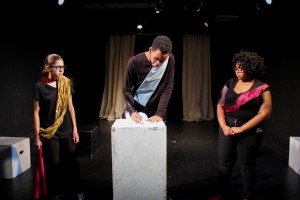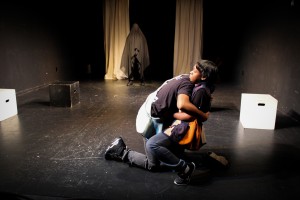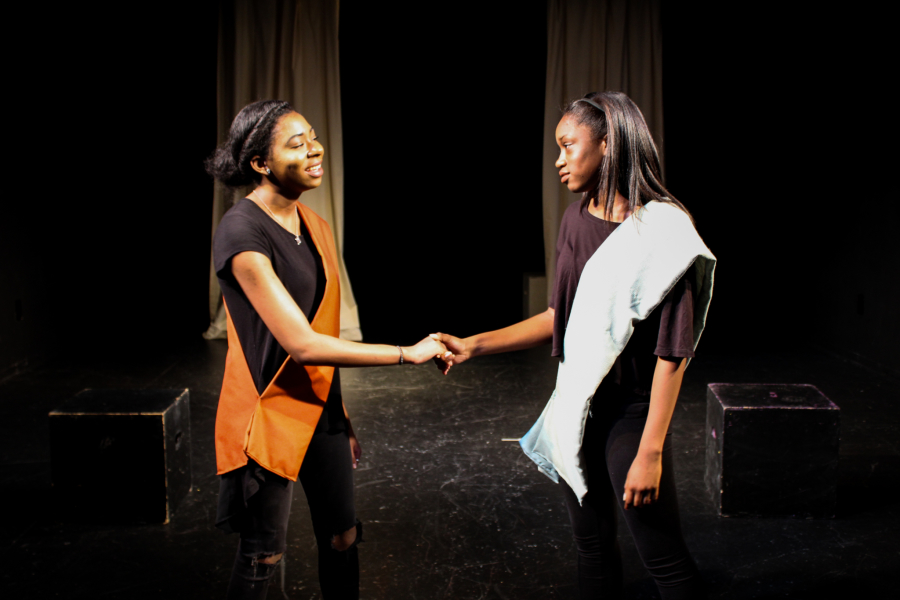“I actually kind of know what it feels like to be Caesar.”
So says Isaac, a recent high school graduate from Puerto Rico. He pauses slightly before adding, “Well, not literally.”
Sitting across from Isaac at the Stella Adler Studio of Acting in New York City is Mackenson, a high school senior who moved to New York from Haiti three years ago. The two are discussing whether they relate to the Roman characters in Julius Caesar, and how far removed they feel their lives are from the Bard’s own. “He was a real person,” reasons Isaac. “I think he would be proud to see that his work is still alive.”
Both students are at Stella Adler as part of the studio’s summer Shakespeare program, which brings in underserved high school students every summer for a five-week intensive. The program, now in its seventh year, is designed for students who don’t have arts education opportunities in their schools, and takes both financial need and lack of arts exposure into account when selecting from the applicant pool. The program is part of the studio’s outreach division, but all the instructors teach classes in the other programs as well.
The goal, explains the studio’s director of cultural programming, Nina Capelli, is to empower students through the process of making theatre. “It’s not about being a great actor,” says Capelli. “It’s about studying craft, deriving a sense of strength from that craft, and feeling that you’ve grown in some way. If students get anything from this program that they can apply to any other aspect of their lives, that’s a huge success for us.”
Theatrical craft was a mystery to Mackenson, who grew up without any real exposure to theatre. “I played soccer almost all my childhood,” he says. “I loved it. But when I watched movies, I’d think, What would it be like if that were me?” He originally found out about the studio from a flyer posted on the wall of his high school. “I didn’t know anything about acting,” he says. “I just took the paper and called.”

Isaac, who has lived in Puerto Rico his entire life, does come from a performing arts background. He grew up dancing, and found out about the studio after his cousin went through the same program last year. When he was accepted and arrived at the studio, he says he was nervous—at least until he saw a familiar face. “There are all these photos of famous actors who have gone through the training,” he says. “And, like every Puerto Rican, I was looking for someone with my roots. But I never imagined I would see Benicio del Toro’s face in one of the pictures. That was what pushed me over—I thought, ‘Hey, he did it, you can do it too.’”
For most of the students in the program, Shakespeare’s Elizabethan world is new and unfamiliar territory—which is exactly why the studio chooses the Bard. “In the beginning, you always see some wide eyes, like they’re staring into the face of a giant,” says Capelli. “They can’t believe what’s in front of them.”
The giant, thankfully, generally proves tameable, even for the program’s most uneasy students. “You see their moments of realization,” Capelli says. “Of, ‘Oh, I know more about this than I thought I knew.’”
For Isaac and Mackenson, Shakespeare’s world and characters proved closer to their own than they had expected. “You can relate to his themes because they’re still happening,” explains Isaac. “Like someone being violent because they feel like they’re going to be stepped on—that still happens today.”
Mackenson saw a similar universality in his role. “Caesar has a high and mighty attitude, but he doesn’t see it as a weakness,” the student explains. “He sees it as his strongest point…It was that ‘strongest point’ that led to his demise.” Isaac shrugs, “Julius was a stubborn man.”
Before receiving the plays, the students go through what Capelli describes as “boot camp,” a weeklong crash course in acting. This week involves movement, voice, and speech lessons. “I used to speak very fast—if I spoke onstage you wouldn’t understand anything,” says Isaac. “But I just had to take my time; that’s what they taught me. Take your time. Take deep breaths. It’s your time. Now that idea is just a given for us.”

After the first week, students spend four weeks working on a condensed Shakespeare play before performing the work in a barebones production for an invited audience. Having a final product helps students “validate for themselves that they’ve learned something in a very specific way,” says Capelli.
The performance of Julius Caesar had players entering to Kanye West’s “Dark Fantasy,” and actors, dressed in all black, wore different colored sashes as costumes, hiding themselves behind black umbrellas to mimic being offstage. At times, it had the feeling of edgy downtown theatre.
The real final product, though, is what the actors carry with them after the performance. After all, the Studio’s tagline is “growth as a human being and growth as an actor are synonymous,” a line taken from Adler’s personal credo.
“Being here has opened me up more, to talk to people, to be social and engage,” Mackenson describes. “Our instructor would tell us, ‘Be aware of your surroundings.’ She gave us a homework assignment to go on the subway and observe people—to see things in a different way, to notice things you never have before.” After that, says Mackenson, “You experience the world differently…You learn to be a better person.”
That’s a comment that would surely make Stella Adler smile.


